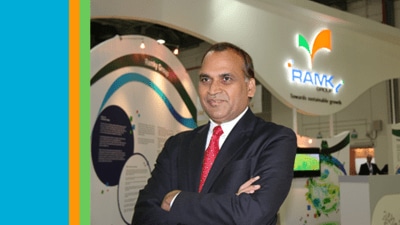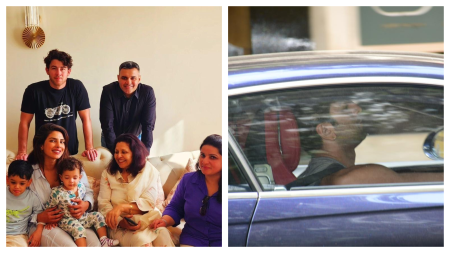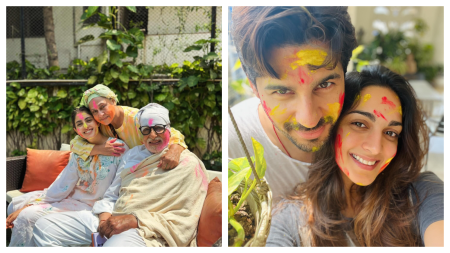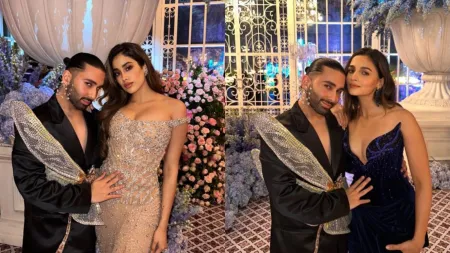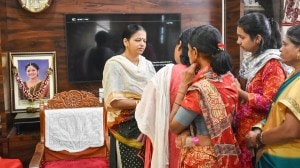- India
- International
Is Old Gold?
Remaking a film can have its benefits, but the flipside is the intense scrutiny that follows. Is adapting a classic, then, a double-edged sword? Screen examines the pros and cons
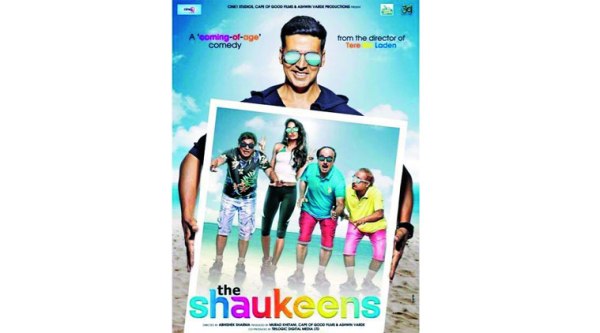 The Shaukeens
The Shaukeens
By Kanika Rajani
The past few years have seen film-makers making some notable remakes of Hindi films. Only a month back we saw Sonam Kapoor in a fairytale romance, a remake of the 1980 Khoobsurat. Before that there was David Dhawan’s Chashme Baddoor, a take on the 1981 romcom. And who can forget Rohit Shetty’s hilarious adaptation of the 1979 Golmal into Bol Bachchan. This week sees the release of The Shaukeens a remake of the rib-tickling 1982 comedy, Shaukeen.
The past has always intrigued us and all arts refer to the history of its respective art forms for inspiration, references and in the quest for further knowledge. Perhaps, it was Sanjay Leela Bhansali’s award-winning Devdas (2002) which gradually gave rise to the trend of Hindi classics being remade. Devdas is a case in point of a story that has interested film-makers since 1935 when the 1917 novel of the same name by Sarat Chandra Chattopadhayay was first directed by Pramathesh Barua. This was then remade for the second time by Bimal Roy in 1955 and for the third time by acclaimed director Sanjay Leela Bhansali in 2002.
A little while later it modernised by none other than Anurag Kashyap in 2009 as
Dev D.
But Bollywood casts the net wide. Besides old Hindi classics, the industry also draws inspiration from foreign films, Hollywood and regional cinema, especially from South films. “In the case of South remakes, producers adapt them to cater to the taste of the north Indian audience, or shape it like a mainstream Bollywood film,” says director Hansal Mehta.
Be it Sajid Nadiawala’s Kick which is a remake of the Telugu action-comedy by the same name, or Rowdy Rathore (2012) which was also a remake of Vikramarkudu (2006), Hindi remakes of South films are plenty and have always drawn attention.
In comparison there are barely a handful of Hindi classics that have been remade. They include Devdas, the Amitabh Bachchan starrer Don and Mukul Anand’s Agneepath.
“There are some films that are hard to remake because it’s very hard to make them any better. It’s like creating a big trap for yourself,” explains Karan Anshuman, Founder of upperstall.com and director of the to-be-released Bangistan. He further cites the example of Sholay which he feels is timeless, “A film like that, or a Mughle-e-Azam are good examples of films that should not be remade.”
Remaking old Hindi classics that have already passed the test of time limits the scope of how a film-maker can better it. However, according to Mehta, a lot of film students are disconnected from India’s film history and a remake of a classic can prove to be very interesting, if it manages to bridge gap with the past and the present. “I go to film institutes and I feel very sad that most of the students have not seen films of the fifties and sixties which were rich in content. Somewhere the lack of exposure to content that Indian cinema used to have earlier has led to this disconnect. If a remake of a classic can bridge that disconnect of the new generation with the past and the present then remaking a film could serve a purpose. But you need to modernise it and present it in a form that communicates in today’s cinematic language to the audience.”
The very fact that a director is remaking a classic film of any kind (regardless of its genre or language) bears testimony to the fact that here was a film that did well for its times, or that it’s a story worth telling and its theme is universal and is relevant in whichever time period it’s retold. For instance Vishal Bhardwaj’s Haider, which has been adapted from Shakespeare’s Hamlet. The beauty of Haider lay in how successfully it was contemporised, and reflected the current socio-political scenario in Kashmir. The film even touched upon the plight of half-widows in Kashmir through the depiction of Tabu’s character.
But alas there are films that ride on the success of the original as Anshuman explains some of the approaches that go behind the remaking of a film. “Many times there was a great idea but it did not translate into a good film. Remaking it with a different perspective can fix all the mistakes of the original film. In the case of classics, film-makers piggyback on the success of a classic, and usually end up making a film that’s not better than the original. Film-makers also take a bad film and make it into another bad film.”
While on one hand a film is likely to do well if it worked in a certain decade, there’s no guarantee that it’ll succeed again. Yet, there are some stories that will be loved and cherished, regardless of which time period they’re told in. Farhan Akhtar’s remake of Don was an example that did successfully while David Dhawan’s Chashme Baddoor was average.
“Chashme Baddoor essentially borrowed the idea of three guys attracted to the same girl from the original. The concept of the film was similar to the original, but the rest was different. Many a time, directors take the title, that’s it. In those cases it’s not really fair to compare it to the original,” explains Anshuman, admitting that David Dhawan’s film didn’t match up to the original.
Comparisons exist even if a film merely refers to another film, piece of literature, or a play, let alone borrowing the basic concept of the original film. As Shashanka Ghosh, director of Khoobsurat (2014) a remake of the 1980 Rekha starer of the same name, agrees that there’s more pressure to make a remake. “I also got criticised. The industry tends to analyse. However, if you’re a good film-maker, you have to hold onto your convictions as everyone is entitled to their opinion,” he states.
It’s not only directors who tread carefully while remaking films, but even actors who are well aware of the comparisons and expectations that tag along when acting in a remake or classic. Kalki Koechlin when preparing for her role in Dev D an adaptation of Devdas says that she did not watch the original. “I think seeing Madhuri’s performance would’ve put more pressure on me. The makers of Dev D warned me not to watch Devdas and told me to bring a fresh perspective to my character. Besides, Chandramukhi was kind-hearted while Chanda was unapologetic about her behaviour. Had I seen it I would have had several preconceived notions,” says Koechlin.
Ghosh also talks about his initial reservations before making Khoobsurat as he mentions how he feared the remake would turn out to be a romance. “I initially felt the original story wouldn’t hold today as it was about a young girl coming into her sisters house, and we should turn our film into a romance. His reservations, however, were put at ease when none other than Siddharth Roy Kapur, MD Disney India praised his film and said it had nothing to do with the original except the central idea. “Siddharth used to say it’s a different film and kept referring to it as ‘aafat’ (in reference to the accident prone and clumsy character Sonam Kapoor was depicted in the 2014 remake). However, both Sonam and Rhea (Kapoor) felt strongly about making it a tribute.”
Given the prickly topic a refusal to disclose any details are common to directors who are contemplating remakes. Khalid Mohamed’s Katha which is based on Sai Paranjpye’s Katha (1983) refuses to disclose any details about the remake he’s working on. “Speaking for myself, I see remakes as an opportunity to salute the original,” states Mohamed when asked for his take on the trend of remaking classics.
While there have also been talks about Hansal Mehta remaking Mahesh Bhatt’s Saaransh, (1984), Mehta clarifies that he’s still contemplating remaking it. “I’m currently working on something. Once I’m done with that, I will think about it and only if I’m able to reinterpret and give a new life to Saaransh, I will remake it,” he reveals.
Abhishek Sharma whose The Shaukeens is an adaptation of Basu Chatterjee’s Shaukeen talks about the unseen irony that’s attached to remaking a film. “We speak of remakes in a derogatory manner, but there is no such noise when people turn old plays into films. There is no comparison then, but when you work on a film script and adapt it, suddenly there is a comparison because it is a film versus film.”
“Whether it’s an adaption, remake, loosely inspired, you have to put out an entertaining package: Ultimately everybody is shooting in the dark. Film-making is a gamble. Just 10-12 percent of films are absolute hits in terms of return on investment,” remarks exhibitor and distributor, Akshaye Rathi as he talks about how there’s no formula for success.
While there may not a mantra for a film to both succeed at the box office and be critically acclaimed, there’s surely one factor that applies for remakes, it needs to find its own voice. But how is that possible? “I can take you through a happy scene anywhere, the emotion will be the same, but the situation will differ. Even when a director remakes a film, it’s not possible to replicate every frame,” explains Ghosh as he sheds light on how even a remake or an adaptation will be reflective of its director’s vision.
Given the scenario so far—approximately 62.5 percent of remakes made in a span of 12 years have proved to be successful, and with The Shaukeens, yet another remake releasing this week, and Khalid Mohamed’s Katha in the pipeline, one can conclude that despite the creative odds, this is one trend that will continue, thanks to its commercial viability.
kanika.rajani@expressindia.com
Photos
Apr 26: Latest News
- 01
- 02
- 03
- 04
- 05











